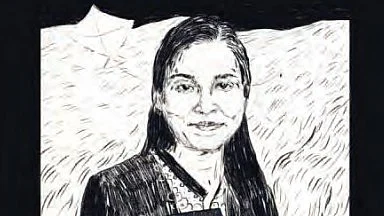Opinion
‘Is this what justice looks like?’ asks Gulfisha Fatima
What would you make of words like ‘law’, ‘justice’, ‘Constitution’? And what of those eloquent weekend speeches of our learned judges?

Picture this: you’re sitting at home when the police barge in and arrest you. You ask, “What have I done?” They rattle off charges, each one more grave than the other. You’re stunned. It’s all lies, a cooked-up story, you say… but who is listening? You’re thrown behind bars. You ask, on what basis have these charges been brought against me? You hear: “Prove your innocence in court.” That strangely gives you hope. You ask, “How do I present the truth, the evidence before the court?” That’ll happen once the trial begins, you’re told. So, when does the trial begin? That could take years.
“If the trial hasn’t even begun, why am I in jail?” “That’s the law. Technically, there is no bail in this offence. But if you want to get out, approach the court.” Hope flares again. You file a bail application. After months, your case finally comes up for hearing. Several appearances later, the arguments conclude. But there is no judgement for months. Meanwhile, the judge is transferred. A few months later, there is a new judge, and the whole hearing starts again. No verdict again. Another new judge. More dates, more delays.
After spending years like this, what would you make of words like ‘law’, ‘justice’, ‘Constitution’? And what of those eloquent weekend speeches of our learned judges? Ask Gulfisha Fatima, or Khalid Saifi, or Umar Khalid.
This isn’t an imaginary nightmare scenario; it’s the real story of dozens of activists jailed after the Delhi riots of 2020. Our senior judges like to wax eloquent on constitutional values and human rights. The Supreme Court directs that bail pleas must be heard swiftly — and no matter what, a decision taken within two weeks.
Published: undefined
Yet, right under its nose, these activists have no decision on their bail applications — not in two weeks, not in two months, not even in two years. Their crime? That they are Muslim and they protested — peacefully, democratically — against a law.
The story of Gulfisha Fatima will go down in the annals of India’s judicial history. After graduating from Delhi University and following it up with an MBA, Gulfisha became a radio jockey. She joined the protests against the Citizenship Amendment Act (CAA), participating in a sit-in at Seelampur, inspired by the Shaheen Bagh protests. She was neither involved in nor accused of any act of violence. But in the crackdown on CAA protestors after the Delhi riots, Gulfisha too was picked up — on 9 April 2020.
There was no straightforward case of rioting or vandalism against her, so the police booked her on the charge of being part of a secret conspiracy behind the riots — and to ensure she wouldn’t get bail easily, they levelled charges under the draconian UAPA (Unlawful Activities Prevention Act).
Thus began a long, bruising court battle. A full year after her arrest, she applied for bail in a lower court. After several months, in March 2022, her application was rejected. At least that judge delivered a verdict, even if it was negative. But when she went to the high court, even that didn’t happen. Her appeal was filed in May 2022. It finally came up for hearing in January 2023. The hearing concluded in a month, but there was no decision.
Meanwhile, three other activists arrested in similar circumstances — Natasha Narwal, Devangana Kalita and Asif Iqbal Tanha — did get bail from the same high court. Based on this, Gulfisha filed a fresh bail application in May 2023. But still no judgement, nor a fresh hearing. Coincidentally, in October, the presiding judge was transferred — and left without pronouncing a verdict.
Published: undefined
So the case started all over again, with a new bench. More delays. Finally, the matter came up in March 2024. The hearing wrapped up in a day — as it should have. But again, no verdict. As luck would have it, this judge too was transferred in July. Another new bench, another hearing.
Exhausted, Gulfisha turned to the Supreme Court. By another strange coincidence, all these cases seem to land before a particular judge in the Supreme Court, who tends to give a particular kind of ruling. Despite the unconscionable delay in bail proceedings, the Supreme Court sent Gulfisha right back to the same high court that had driven her to approach the Supreme Court in the first place. Yes, the apex court did instruct that the hearing be expedited, but since November 2024, three benches of the Delhi High Court have heard her case. It’s been five years now.
Do not make the mistake of thinking this is just a tragic symptom of the Indian justice system — that Gulfisha’s case is no different from everyone else’s. Sure, judicial delays are not new, but in cases where the government has a particular interest, it is extraordinary to not have a decision even on a bail plea.
All this is happening in a country where the Supreme Court opens on a Saturday to grant bail to Arnab Goswami. Where the son of former minister Ajay Mishra Teni — accused of mowing down farmers — gets bail. Where a rape accused is released because maybe the girl was careless. Where convicted rapist and murderer Ram Rahim keeps getting parole after parole.
But Gulfisha Fatima, Khalid Saifi, Sharjeel Imam and Umar Khalid? They are condemned to remain behind bars. Is this justice? Maybe not today, but some day, history will ask this question of India’s judicial system. And on that day, Lady Justice will hang her head in shame.
Published: undefined
Follow us on: Facebook, Twitter, Google News, Instagram
Join our official telegram channel (@nationalherald) and stay updated with the latest headlines
Published: undefined